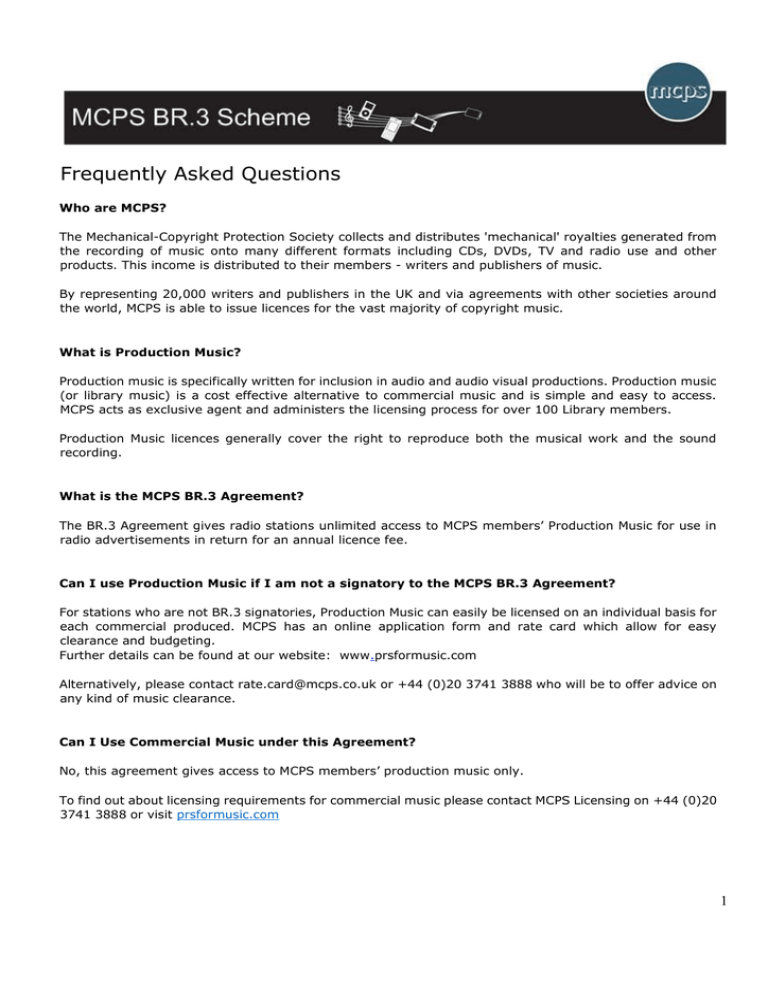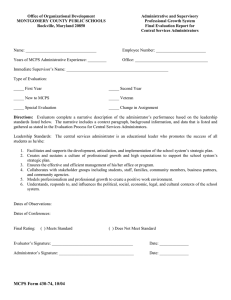Frequently Asked Questions
advertisement

Frequently Asked Questions Who are MCPS? The Mechanical-Copyright Protection Society collects and distributes 'mechanical' royalties generated from the recording of music onto many different formats including CDs, DVDs, TV and radio use and other products. This income is distributed to their members - writers and publishers of music. By representing 20,000 writers and publishers in the UK and via agreements with other societies around the world, MCPS is able to issue licences for the vast majority of copyright music. What is Production Music? Production music is specifically written for inclusion in audio and audio visual productions. Production music (or library music) is a cost effective alternative to commercial music and is simple and easy to access. MCPS acts as exclusive agent and administers the licensing process for over 100 Library members. Production Music licences generally cover the right to reproduce both the musical work and the sound recording. What is the MCPS BR.3 Agreement? The BR.3 Agreement gives radio stations unlimited access to MCPS members’ Production Music for use in radio advertisements in return for an annual licence fee. Can I use Production Music if I am not a signatory to the MCPS BR.3 Agreement? For stations who are not BR.3 signatories, Production Music can easily be licensed on an individual basis for each commercial produced. MCPS has an online application form and rate card which allow for easy clearance and budgeting. Further details can be found at our website: www.prsformusic.com Alternatively, please contact rate.card@mcps.co.uk or +44 (0)20 3741 3888 who will be to offer advice on any kind of music clearance. Can I Use Commercial Music under this Agreement? No, this agreement gives access to MCPS members’ production music only. To find out about licensing requirements for commercial music please contact MCPS Licensing on +44 (0)20 3741 3888 or visit prsformusic.com 1 Do I need any other licences to be able to use Production Music? The BR.3 licence is a reproduction licence only; it does not cover the right to broadcast the production music in the advertisement. A MCPS licence is required to broadcast the Production Music sound recording and a PRS licence is needed to broadcast the Production Music musical work. Radio stations that are RadioCentre members are licensed for this broadcast under the PRS/RadioCentre and MCPS/RadioCentre Blanket Agreement. If your station is not a Radio Centre member please contact radiolicensing@mcps-prs-alliance.co.uk for alternative licensing arrangements. Why has the BR.3 scheme changed? The restructuring of the BR.3 agreement is being driven by fundamental changes in the radio market that have taken place since the scheme was introduced 10 years ago. In particular, these changes are meant to address: The emergence of DAB radio; Simulcasting on multiple platforms and; Changes in the way ads are produced and sold across the UK radio network How are BR.3 fees determined? BR.3 fees are based on a table which match a radio station’s TSA against fee levels. There is a 10% uplift over basic fees for any radio station that wishes to ‘share’ commercials. 2012/13 Fees are as follows: Fees quoted exclude VAT Fees 1st October 2012 - 30th September 2013 TSA Split Frequency 25% Uplift Base Fee Sharing Commercials 10% Uplift 0 - 100,000 or Digital only £3,007.15 £752.02 £300.16 100,001 - 500,000 £4,768.92 £1,191.96 £476.78 500,001 - 1,000,000 £6,866.77 £1,716.42 £685.92 1,000,001 - 2,000,000 £9,154.25 £2,288.56 £914.56 2,000,001 - 5,000,000 £10,300.70 £2,574.63 £1,029.42 5,000,001 - 10,000,000 + £11,444.98 £2,860.70 £1,144.28 July 2012 RPI 3.2% Are the published fees amended each year? Fees and Commercial Sharing Uplifts will be increased in respect of each contract year by RPI using the annual change in RPI for the month of July. 2 What happens if the TSA increases over the year and my station falls into the next fee banding? The annual licence fees are based on the TSA for the quarter previous to a new contract year. Licence fees would not be amended if significant changes take place during a contract year. However, these changes to audience may affect licence fees for the subsequent contract year. Licensees are required to notify MCPS of any change in TSA. If this change results in a change in fee bracket there will e an adjustment for the next licence period. How does MCPS define ‘Commercial Sharing’? Sharing means a commercial that is produced by one BR.3 licensed radio station or its authorized producer, but broadcast by another BR.3 licensed station. Can I share commercials with other radio stations? Commercials may be shared between stations provided that: 1. each station holds a valid BR.3 licence, 2. the station creating/providing the advertisements has paid the appropriate sharing uplift of 10% on their licence fees; 3. each station reports the commercial in its MCPS music usage reports and declares the commercial as ‘shared’; In terms of making a decision to pay the uplift, most licensees will want to focus on the ‘providing’ side of sharing. That is, does your station regularly create commercials for broadcast by other radio stations/groups? If yes, then the sharing uplift is the most economic way to proceed. Another way to describe it would be, if your station/group generates meaningful funds from producing ads that are distributed across the UK radio sector, you will want to select the sharing uplift option. However, for stations that produce or broadcast few shared commercials, they may elect not to pay the sharing uplift, but will then have to license any shared commercials via the MCPS rate card (www.prsformusic.com) prior to broadcasting. Please note, any advertisements which are produced for the public sector and are required to be broadcast nationally, will be exempt from this sharing provision. If two different stations share a nominated producer does this count as Commercial Sharing and do I need to pay the uplift? If two stations use the same production company to produce the same commercial this would not be considered ‘sharing’, provided that each station individually reports the music used to MCPS as standard. Do I have to pay more if I operate a split frequency service? If you operate a split frequency service, a 25% uplift will be charged. 3 What happens if I simulcast the programme online or via DAB? MCPS has agreed not to apply a digital simulcast uplift in return for BR3 licensees committing to the scheme for the period October 2006 to September 2009, with no option for the station to terminate during that period. After two years, this licence scheme will become a rolling agreement. Please note, that for Digital only stations that are not simulcasts of an analogue broadcast, a separate BR.3 licence is required. These broadcasters will be placed in the lowest fee band. Who is responsible for commercials produced under this agreement? Commercials made under your BR.3 Agreement can be produced by up to 4 of the following: (a) the Licensee using its own in-house production facilities and its own staff, or; (b) a duly appointed third party production company, or; (c) in the case of group BR.3 licensees, the Licensee’s radio group creative department In all cases, this is an exclusive agreement and is not transferable without the prior written consent of MCPS. What happens if I want to use more than one authorised producer? Commercials made under this agreement can only be produced for the licensee by 4 authorised producers. Any commercials made by additional producers would need to be licensed on an individual basis by using the online application form and rate card at: prsformusic.com How much notice do I need to give if I change my authorised producer? Licensees must give a minimum of 14 working days written notice before changing any of their authorised producers. Appendix 2 (Notification of Nominated Producer) of your BR.3 Agreement must be fully completed and submitted to MCPS. Why do I need to submit music usage returns to MCPS? The submission of full reporting data which details every piece of production music used is a conditional part of the BR.3 Agreement. This data allows MCPS to distribute licence fees to the publishers and their composers of the tracks used. How do I submit details of the music I have used to MCPS? Data must be supplied in an approved electronic format which is provided by MCPS. This should be emailed to MCPS on a quarterly basis and within 28 days of the end of the relevant quarter (for example, returns for the period January to March 2011 will need to be supplied to MCPS before the end of April 2011). In exceptional circumstances, licensees may use a non-standard format to supply returns, provided that MCPS has granted explicit approval in its absolute discretion for this beforehand. 4 Are there any discounts to the published rates available? The table of fees which will be published each year is non-negotiable and discounts are not available. Is there a ‘term’ to the BR.3 Agreement? The BR.3 agreement is a ‘rolling’ agreement but the fees are adjusted on a yearly basis. The fees are in effect from 1 October to 30 September for each year. How does the ‘rolling agreement’ work? To ease time spent administering the BR.3 agreement each year, licensees will only need to sign the contract once. This means, unless indicated otherwise, your agreement will continue on a yearly basis. However, each year in August MCPS will contact you with details of the new fee levels and applicable TSA. Is there a notice period if I want to terminate my agreement? MCPS has agreed not to apply a digital simulcast uplift in return for BR3 licensees committing to the scheme for the period October 2006 to September 2009, with no option for the station to terminate during that period. From 1st October 2009, there is a 3 month notice period which is subject to written notice and MCPS’s discretion. The date of termination must be the end of a calendar quarter. If the contract needs to be terminated because the station is being sold, MCPS may at its discretion agree to terminate the Agreement from the date that ownership ceased, provided at least 28 days written notice has been received. MCPS reserves the right to terminate the agreement at any time for material breach of contract with 14 days written notice. If I operate a ‘group’ agreement what happens if I buy or sell a station during the contract year? If a new station is launched or acquired during the contract year MCPS must receive written notification before the station is acquired or, in the case of a new station, before transmissions commence. Fees will be based on that station’s existing TSA. If the contract needs to be terminated because the station is being sold MCPS may at its discretion agree to terminate the Agreement from the date that ownership ceased, provided at least 28 days written notice has been received. How will my station(s) be invoiced? Invoices will be issued bi-annually each contract year which runs from October to September each year. The first invoice is usually issued in September to cover the period October to March. A second invoice is therefore issued in March to cover the period April to September. Group licensees will be issued one invoice bi-annually which will cover all stations in their group. 5 How long do I have to pay the invoice? Payment must be received in full (including the VAT element) within 28 days of the date on which the invoice is issued. Who can I speak to if I have any other queries? Please contact the Broadcast and Online Advisor, Jennifer Hall, if you have any other queries: Tel: +44 (0)20 3741 4430 jennifer.hall@prsformusic.com These guidelines have been produced to assist as regards the operation of the BR.3 licensing scheme. However, they are only a summary of certain terms of the scheme and licensees are advised to refer to the full BR.3 agreement which will be issued shortly for full details of rates, exclusions and other matters referred to in these guidelines. In the event of any inconsistency between these guidelines and the BR.3 agreement, then the terms of the BR.3 agreement shall prevail. 6

